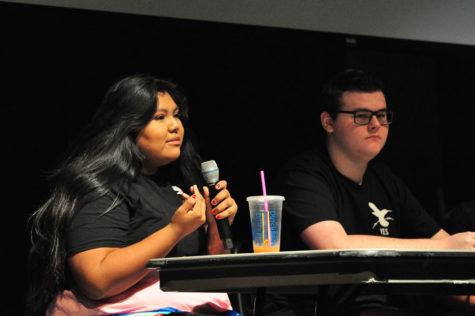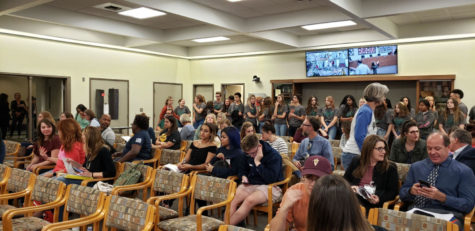Perry teachers sound off on Deep Equity policy
The recently introduced Deep Equity program has been met with both approval and criticism from Perry staff members. Here’s what your teachers have to say about the new policy. The Precedent editorial staff chose to keep the teachers’ names anonymous in order to protect their identity.
PRO:
The Deep Equity professional development trainings that the teachers have been required to attend since last year have been culture shifting.
Students have valuable knowledge about the culture in which they live that impacts their learning in the classroom. This knowledge should be used as a tool in every classroom by teachers on this campus.
The pair to Deep Equity is the Youth Equity Stewardship program in which students peer and self select as leaders on campus that seek to transcend the classroom. They identify as ambassadors who have chosen to work with faculty and staff in order to start to communicate and collaborate.
The Equity programming is not politically charged it is empathy based.
Our students are not asking for teachers to change their religious or political beliefs, but rather acknowledge that they exist and are valid human beings. Although the Deep Equity and Youth Equity programs are assumed to be only about race is incorrect.
They are about equity across race, ethnicity, sex, sexual identity, gender identity, age, physical ability, mental illness, mental ability, religion, and social economic status.
Perry’s population is more diverse than it was when we first opened and we must learn how to teach all our students not just the ones we feel comfortable with.
CON:
According to the Corwin publishing company that is responsible for the Deep Equity curriculum, the goal of the program is to “produce the deep personal, professional, and organizational transformations that are necessary to create equitable places of learning for all our nations children.”
This program is built around the work of Gary Howard. The underlying theory behind the Deep Equity program and a consistent theme of Gary Howard’s work is a desire to root out what he calls “white privilege.” In his essay titled “How We Are White,” Howard describes how white people can learn to move from a fundamentalist orientation of ignorance and feelings of supremacy toward a transformationist orientation that “allows us to acknowledge our inevitable privilege and racism while we work to dismantle our legacy of dominance.”
CUSD has a long history of promoting academic excellence. Our mission statement is “to empower all students with the knowledge, skills and attitude necessary to excel in college, career and life.” Our diverse faculty and student population is a driving force behind that goal. However, the Deep Equity curriculum and trainings work against our closely held community values and our CUSD mission statement. By advancing the idea that white members of our community should “acknowledge our inevitable privilege and racism,” this program pushes a divisive and destructive message that pits us against each other. Instead of focusing time on disunion, we should reclaim our passion for providing students a foundation for their academic success by focusing on content and skills acquisition.
Perry teachers sound off on Deep Equity policy
The recently introduced Deep Equity program has been met with both approval and criticism from Perry staff members. Here’s what your teachers have to say about the new policy. The Precedent editorial staff chose to keep the teachers’ names anonymous in order to protect their identity.
PRO:
The Deep Equity professional development trainings that the teachers have been required to attend since last year have been culture shifting.
Students have valuable knowledge about the culture in which they live that impacts their learning in the classroom. This knowledge should be used as a tool in every classroom by teachers on this campus.
The pair to Deep Equity is the Youth Equity Stewardship program in which students peer and self select as leaders on campus that seek to transcend the classroom. They identify as ambassadors who have chosen to work with faculty and staff in order to start to communicate and collaborate.
The Equity programming is not politically charged it is empathy based.
Our students are not asking for teachers to change their religious or political beliefs, but rather acknowledge that they exist and are valid human beings. Although the Deep Equity and Youth Equity programs are assumed to be only about race is incorrect.
They are about equity across race, ethnicity, sex, sexual identity, gender identity, age, physical ability, mental illness, mental ability, religion, and social economic status.
Perry’s population is more diverse than it was when we first opened and we must learn how to teach all our students not just the ones we feel comfortable with.
CON:
According to the Corwin publishing company that is responsible for the Deep Equity curriculum, the goal of the program is to “produce the deep personal, professional, and organizational transformations that are necessary to create equitable places of learning for all our nations children.”
This program is built around the work of Gary Howard. The underlying theory behind the Deep Equity program and a consistent theme of Gary Howard’s work is a desire to root out what he calls “white privilege.” In his essay titled “How We Are White,” Howard describes how white people can learn to move from a fundamentalist orientation of ignorance and feelings of supremacy toward a transformationist orientation that “allows us to acknowledge our inevitable privilege and racism while we work to dismantle our legacy of dominance.”
CUSD has a long history of promoting academic excellence. Our mission statement is “to empower all students with the knowledge, skills and attitude necessary to excel in college, career and life.” Our diverse faculty and student population is a driving force behind that goal. However, the Deep Equity curriculum and trainings work against our closely held community values and our CUSD mission statement. By advancing the idea that white members of our community should “acknowledge our inevitable privilege and racism,” this program pushes a divisive and destructive message that pits us against each other. Instead of focusing time on disunion, we should reclaim our passion for providing students a foundation for their academic success by focusing on content and skills acquisition.

